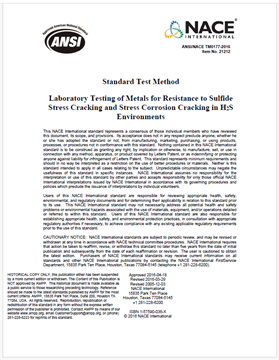Search
TM0198-2016 "Slow Strain Rate Test Method for Screening Corrosion-Resistant Alloys (CRAs) for Stress Corrosion Cracking in Sour Oilfield Service"
Also Purchased
TM0204-2004, Exterior Protective Coatings for Seawater Immersion Service
Product Number:
21244-SG
ISBN:
1-57590-190-0
Publication Date:
2004
$179.00
NACE TM0177-2016, Laboratory Testing of Metals for Resistance to Sulfide Stress Cracking and Stress Corrosion Cracking in H2S Environments
Product Number:
21212-SG
Publication Date:
2016
$179.00
TM0194-2014-SG, Field Monitoring of Bacterial Growth in Oil and Gas Systems
Product Number:
21224-SG
ISBN:
1-57590-192-7
Publication Date:
2014
$109.00




